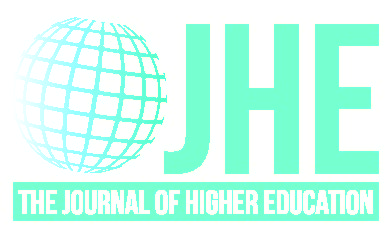Instructions for Authors
To submit, please visit the Journal of Higher Education website at Taylor and Francis: http://www.tandfonline.com/toc/uhej20/current
Editorial Board
Tracy Arámbula Turner, Ph.D., University of VermontPeter Riley Bahr, Ph.D., University of Michigan
Vicki L. Baker, MBA, MS, Ph.D. SHRM-CP, Albion College
Sondra N. Barringer, Ph.D., Southern Methodist University
Cameron C. Beatty, Ph.D., Florida State University
Angela Boatman, Ed.D., Boston College
William Casey Boland, Ph.D., Baruch College- The City University of New York
Nicholas A. Bowman, Ph.D., University of Iowa
Roshaunda L. Breeden, Ph.D., East Carolina University
Kaleb L. Briscoe, Ph.D., The University of Oklahoma
W. Carson Byrd, Ph.D., University of Michigan
Timothy Cain, Ph.D., University of Georgia
Rozana Carducci, Ph.D., Elon University
Isabelle Chang, Ph.D., Temple University
Katherine S. Cho, Ph.D., Loyola University Chicago
Marcela G. Cuellar, Ph.D., University of California Davis
Linda DeAngelo, Ph.D., University of Pittsburgh
Jay Dee, Ph.D., University of Massachusetts Boston
Noah D. Drezner, Ph.D., Teachers College, Columbia University
Antonio Duran, Ph.D., Arizona State University
Brent J. Evans, Ph.D., Vanderbilt University
Eric R. Felix, Ph.D., San Diego State University
Frank Fernandez, Ph.D., Ph.D., University of Wisconsin-Madison
Gina Ann Garcia, Ph.D., University of California, Berkeley
Crystal E. Garcia, Ph.D., University of Nebraska-Lincoln
Jason C. Garvey, Ph.D., University of Vermont
Leslie D. Gonzales, Ed.D, Michigan State University
Ángel de Jesus González, Ed.D., Fresno State University
Casandra Harper, Ph.D., University of Missouri
Jessica Harris, Ph.D., University of California, Los Angeles
Cassandra Hart, Ph.D., University of California, Davis
Michael S. Hevel, Ph.D.., University of Arkansas
Xiaodan Hu, Ph.D., Northern Illinois University
Tara D. Hudson, Ph.D., Kent State University
Sarah S. Hurtado, Ph.D., University of Denver
Megan Iantosca, Ph.D., University of Buffalo
Royel Johnson, Ph.D., University of Southern California
Jennifer M. Johnson, Ph.D., Temple University
Sosanya Jones, Ed.D., Howard University
Vijay Kanagala, Ph.D., Salem State University
Young Kim, Ph.D., Azusa Pacific University
Carrie Kortegast, Ph.D., Northern Illinois University
Amanda O. Latz, Ed.D., Ball State University
Amy Li, Ph.D., Florida International University
Jacqueline Mac, Ph.D., Northern Illinois Universityz
Dina C. Maramba, Ph.D., Claremont Graduate University
Patricia Marin, Ph.D., Michigan State University
Judy Marquez Kiyama, Ph.D., University of Arizona
Heather McCambly, Ph.D., University of Pittsburgh
Kevin R. McClure, Ph.D., University of North Carolina Wilmington
Keon McGuire, Ph.D., North Carolina State University
Soumya Mishra, Ph.D., University of Southern California
Steve D. Mobley, Jr., Ph.D., Morgan State University
Demetri L. Morgan, Ph.D., University of Michigan
Kaitlin N. S. Newhouse, Ph.D., North Carolina State University
Federick Ngo, Ph.D., University of Nevada, Las Vegas
Mike Hoa Nguyen, Ph.D., New York University
Taylor Odle, Ph.D., University of Wisconsin-Madison
Christine A. Ogren, Ph.D., University of Iowa
Wilson Kwamogi Okello, Ph.D., The Pennsylvania State University
Edlyn Vallejo Peña, Ph.D., California Lutheran University
Lara Perez-Felkner, Ph.D., Florida State University
Ann Person, Ph.D., Mathematica
Stephen Porter, Ph.D., North Carolina State University
Brian Pusser, Ph.D., University of Virginia
Gary Rhoades, Ph.D., University of Arizona
Heather T. Rowan-Kenyon, Ph.D., Boston College
Paul G. Rubin, Ph.D., University of Utah
Karina G. Salazar, Ph.D., The University of Arizona
Margaret Sallee, Ph.D., University of Buffalo
Vanessa A. Sansone, Ed.D., The University of Texas at San Antonio
Linda Sax, Ph.D., University of California, Los Angeles
Benjamin Selznick, Ph.D., James Madison University
Daryl Smith, Ph.D., Claremont Graduate University
TJ Stewart, Ph.D., Iowa State University
Amy E. Stich, Ph.D., University of Georgia
Barrett Jay Taylor, Ph.D., University of North Texas
Jason K. Wallace, Ph.D., Mississippi State University
Xueli Wang, Ph.D., University of Wisconsin-Madison
Melissa Whatley, Ph.D., William & Mary
Melvin A. Whitehead, Ph.D., Binghamton University
Stephanie J. Waterman, Ph.D., University of Toronto
Gregory Wolniak, Ph.D., Mathematica
The Journal of Higher Education Special Issue Call
Countering Legislative Attacks on Higher Education: Challenges, Strategies, and Future Directions
Guest Editors
Kaleb L. Briscoe (University of Oklahoma)
Liliana M. Garces (University of Texas at Austin)
Royel M. Johnson (University of Southern California)
In the midst of well-funded and coordinated attacks on higher education in the form of anti-CRT (critical race theory), anti-DEI (diversity, equity, and inclusion) and anti-trans/anti-LGB legislation, this special issue of The Journal of Higher Education focuses on advancing understanding of the nuances of these attacks and, more importantly, developing innovative, forward-thinking strategies for action. The special issue will offer practical, implementable strategies and guidance for higher education institutional leaders, policymakers, and practitioners to navigate and counter these challenges. Once the special issue is published, we will strategize opportunities for authors to meaningfully disseminate their work to relevant audiences.
We seek manuscripts that do one or more of the following:
- Provide discourse analyses of legislative bills targeting CRT, DEI, and LGBTQ issues to unearth their core themes and provide avenues for deeper understanding and insight.
- Develop strategic frameworks that institutional leaders and other stakeholders can employ to advocate for, protect, and advance equity initiatives.
- Employ case studies of success in advancing DEI under restrictive legislative environments.
- Offer collaborative efforts between academia, legal experts, and advocacy groups in countering legislative restrictions.
- Conduct policy analyses and recommendations for navigating and overturning restrictive legislation.
- Provide empirical studies on the effects of restrictive legislation on students, faculty, and staff.
- Offer promising and innovative teaching methods and curricular adaptations that support DEI objectives in constrained contexts.
Interested authors should submit Abstracts (500 words maximum, 12-pt font, one-inch margins, single-spaced) for consideration by August 1, 2024.
- Authors’ names and affiliations (not included in the word count)
- Tentative title (not included in the word count)
- How the manuscript addresses the call of the special issue, including a description of the study/idea, theoretical/conceptual and/or policy or practical contribution, and ability to complete and submit the full manuscript by November 15, 2024 if invited.
Abstracts above the word limit will not be considered.
Once abstract is accepted, invited manuscripts must follow this general format:
- Key framing of the core issues/ideas advanced.
- Data and evidence to support the issues/ideas offered with examples.
- Recommendations and implementable strategies for leaders, educators, students, and policymakers that are grounded in the realities and contexts in which they are situated.
Timeline
- August 1, 2024: Abstracts Due
- September 3, 2024: Decision on Abstracts to Authors
- November 15, 2024: Initial, Full Manuscript Due
- January 2025 : Revise or Reject Decision & Round 1 Feedback to Authors
- February 28, 2025: Revised Manuscript Due
- April 2025: Revise or Reject Decision & Round 2 Feedback to Authors
- May 15, 2025: Final Manuscript Due
- Once accepted, article will be published Online First, with final print publication by August 2025
Submission
Submit your 500-word abstract to go.osu.edu/jhespecialissue by August 1, 2024 | 5:00 pm EDT. No late submissions will be accepted.
Direct inquiries to journalofhighereducation@gmail.com with “JHE Special Issue” in the subject line.
We look forward to your submission.
Best,
Stephen John Quaye
Editor, The Journal of Higher Education



